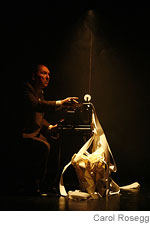5 x 5 Books … is a recommendation of five books that appears regularly in this space. Today’s installment comes from critic Michael Gorra. Michael teaches at Smith College and is the editor of The Portable Conrad (Penguin). I’m about to embark on a bunch of Conrad reading and so prevailed on Michael to set out the perfect primer. As you may remember, he also recently obliged us with a 5 x 5 Books related to Henry James.
But is a scene an incident, or a setting? My list includes both, and while I don’t know if that ambiguity obtains in other languages it seems entirely suited to Conrad. He thought that English words lacked hard edges. There was a fundamental lack of clarity to the language itself in a way that allowed one meaning to penetrate or maybe infiltrate another. So the simplest word might mean several different things — and clearly that confusion suited him.
1. The Secret Agent. I could fill this list with my favorite moments from this novel — it’s sick, I know, but reading this book always cheers me up. Still, I’ve got to skip over the wonderful negatives in the prose of the opening page, or the police constable’s report of his actions with a shovel. Let’s go instead with that “Hyperborean swine,” Mr. Vladimir, who in Chapter 2 instructs the title character to have “a go at astronomy” by bombing the Greenwich Observatory. He is the provocateur’s provocateur, a comic — indeed camp — version of the great tempters of nineteenth-century fiction, like Balzac’s Vautrin or Dostoevsky’s Svidrigailov.
2. Lord Jim. A setting here — the dinner Marlow gives to Jim at the Malabar House in Singapore. I haven’t counted, but it seems to take a hundred pages, in which Jim unfolds his history, protests, doubts, talks entirely too much… And Marlow listens, and then talks to us, tells us of the impression the man has made, ruminates. I wrote that last word unthinkingly, but it’s true: He does chew it all over a few times. It’s the point at which Marlow takes over the narrative, and his voice is so powerful that almost everybody forgets that the book starts in a more-or-less (well, less) conventional third person.
3. Nostromo. Not the scene in the silver-laden boat at night, the one that all readers remember. I like the more grotesque moments. Nostromo — our man — has swum ashore from that boat into the middle of a revolution; everyone believes he is dead. He sleeps all day in the sun, and at night makes his way into the Custom House of the city, drawn by two lighted windows in what should be darkness. He makes his way upstairs, and then stops, arrested by the shadow of a man upon the wall. He is unarmed, and so waits for a moment before going forward. But the shadow is that of a corpse.
4. Victory. English fiction has lots of novels about white men falling to pieces in hot countries. That’s a part of Conrad’s legacy. But nobody ever did it better, not even Graham Greene, and this late novel has a wonderful sequence set in a shabby island hotel, where a ladies’ orchestra plays to a crowd of colonial flotsam. The whole world is cheap and sweaty and shabby; there’s a trio of fabulous villains; and the hotelkeeper is the most wonderfully mediocre of souls, the hollowest of the hollow men. There is a hero, who wants nobler things, but he’s almost an afterthought; the book is most alive in its cheapest moments. I’m surprised Puccini never set it.
5. Under Western Eyes. The student Razumov, having betrayed a man who had trusted him with his secrets and his life, tells a police examiner that he wants “simply to retire.” Which makes his confessor ask, softly, “Where to?” No reader of Conrad will be surprised to learn that what then happens both fulfills the literal terms of Razumov’s desire and proves no retirement at all.
Archives for April 10, 2008
CAAF: Loose notes
“One realizes that even in harmonious families there is this double life: the group life, which is the one we can observe in our neighbour’s household, and, underneath, another–secret and passionate and intense–which is the real life. . . . One realizes that human relationships are the tragic necessity of human life; that they can never be wholly satisfactory, that every ego is half the time greedily seeking them, and half the time pulling away from them. In those simple relationships of loving husband and wife, affectionate sisters . . . there are innumerable shades of sweetness and anguish which make up the pattern of our lives.”
Willa Cather, Not Under Forty (as quoted and elided in Nancy Mildford’s Savage Beauty)
TT: So you want to see a show?
Here’s my list of recommended Broadway, off-Broadway, and out-of-town shows, updated weekly. In all cases, I gave these shows favorable reviews (if sometimes qualifiedly so) in The Wall Street Journal when they opened. For more information, click on the title.
Warning: Broadway shows marked with an asterisk were sold out, or nearly so, last week.
BROADWAY:
 • August: Osage County (drama, R, adult subject matter, closes Apr. 20 and reopens Apr. 29 at the Music Box Theatre for an open-ended run, reviewed here)
• August: Osage County (drama, R, adult subject matter, closes Apr. 20 and reopens Apr. 29 at the Music Box Theatre for an open-ended run, reviewed here)
• Avenue Q (musical, R, adult subject matter and one show-stopping scene of puppet-on-puppet sex, reviewed here)
• A Chorus Line (musical, PG-13/R, adult subject matter, reviewed here)
• Grease * (musical, PG-13, some sexual content, reviewed here)
• Gypsy * (musical, PG-13, adult subject matter, reviewed here)
• In the Heights (musical, PG-13, some sexual content, reviewed here)
• The Little Mermaid * (musical, G, entirely suitable for children, reviewed here)
• November (comedy, PG-13, profusely spattered with obscene language, reviewed here)
• Passing Strange (musical, PG-13, adult subject matter, reviewed here)
• South Pacific * (musical, G/PG-13, some sexual content, brilliantly staged but unsuitable for viewers acutely allergic to preachiness, reviewed here)
• Sunday in the Park with George * (musical, PG-13, too complicated for children, extended through June 29, reviewed here)
OFF BROADWAY:
 • Adding Machine (musical, PG-13, adult subject matter, too musically demanding for youngsters, reviewed here)
• Adding Machine (musical, PG-13, adult subject matter, too musically demanding for youngsters, reviewed here)
• The Four of Us (comedy, PG-13, adult subject matter, extended through May 18, reviewed here)
IN PROVIDENCE, R.I.:
• Blithe Spirit (comedy, G/PG-13, some adult subject matter, closes Apr. 27, reviewed here)
CLOSING SUNDAY ON BROADWAY:
• The Homecoming (drama, R, adult subject matter, closes Apr. 13, reviewed here)
CLOSING SUNDAY OFF BROADWAY:
• The Seagull (drama, PG-13, adult subject matter, closes Apr. 13, reviewed here)
CLOSING SUNDAY IN BALTIMORE:
• A Little Night Music (musical, PG-13, adult subject matter, closes Apr. 13, reviewed here)
CLOSING SUNDAY IN CAMBRIDGE, MASS.:
• The Tempest (drama, G, possible for very intelligent tweens, closes Apr. 13, reviewed here)
ON TOUR:
• Moby-Dick–Rehearsed (drama, G, not suitable for children, touring the U.S. through May 17, reviewed here)
REOPENING THIS MONTH ON BROADWAY:
• Alfred Hitchcock’s The 39 Steps * (comedy, G, suitable for bright children, reopens at the Cort Theatre on Apr. 29, reviewed here)
TT: Almanac
“The quest for certainty blocks the search for meaning. Uncertainty is the very condition to impel man to unfold his powers.”
Erich Fromm, Man for Himself
